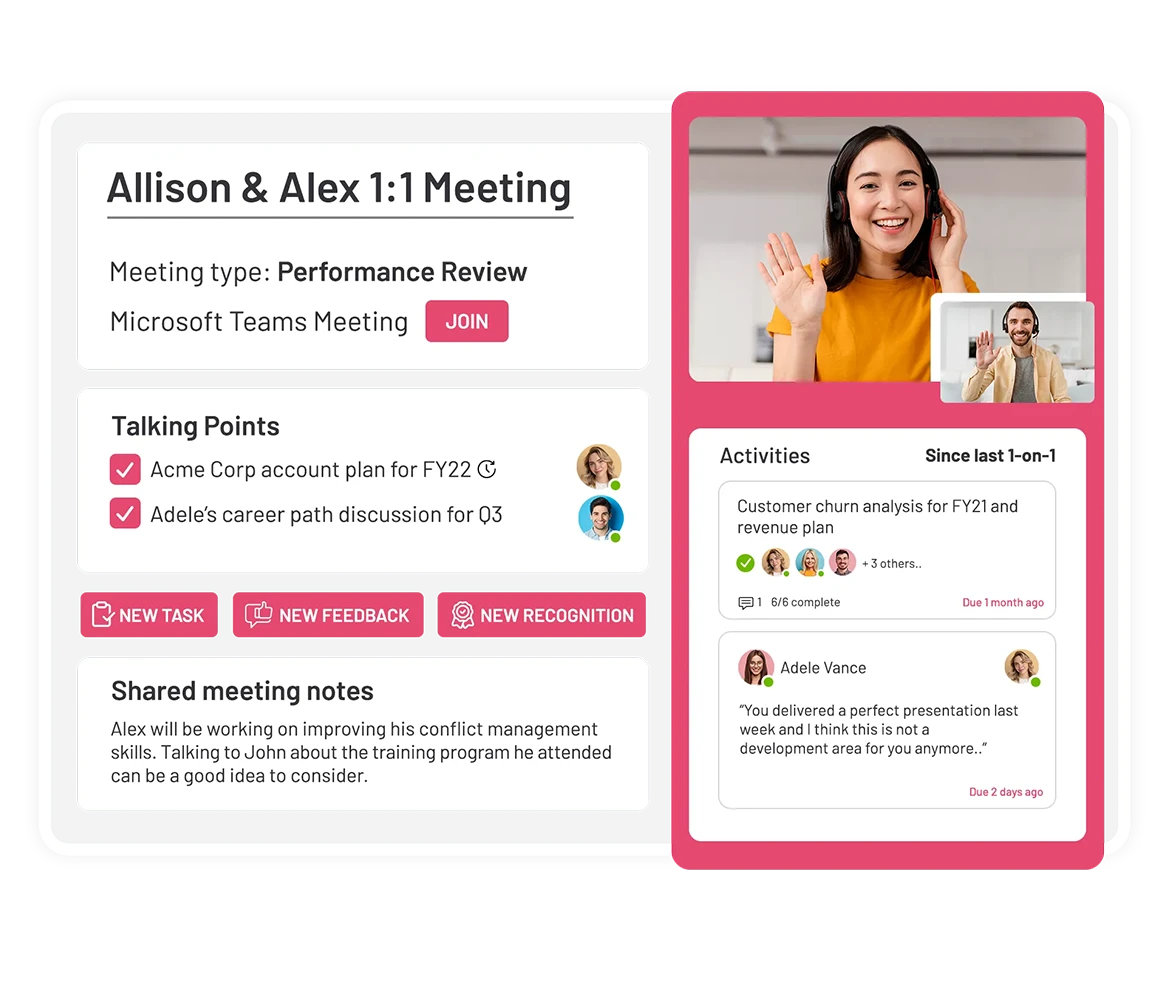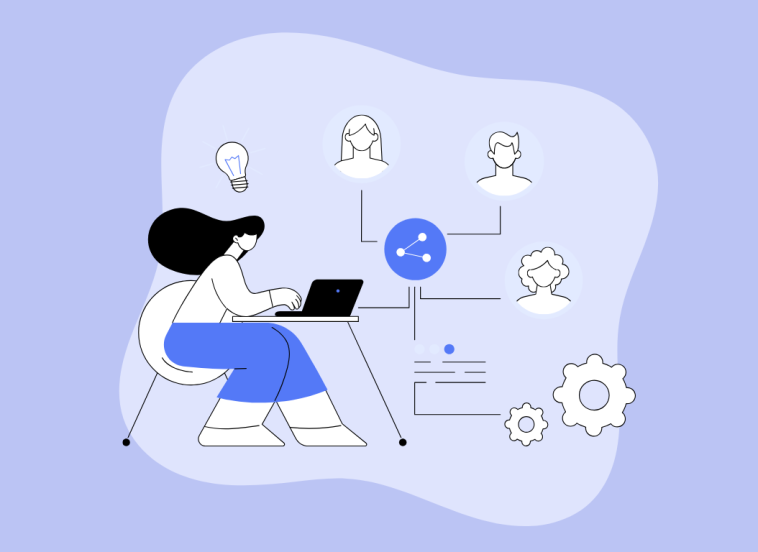HR professionals are continuously challenged to deal with various complexities in their roles. At the heart of it all, HR competencies, the essential skills for all HR professionals, are what make it all stay afloat. Whether it’s about talent acquisition or organizational strategy and development, the role of HR is critical for any business entity that wishes to have sustained success.
HR practitioners excel in their roles for a reason. They contribute to their organizations so meaningfully because of their unique set of skills and expertise which assist them to effectively manage the dynamic needs of both employees and employers.
Let’s take a closer look into what these competencies are, how they provide value to organizations, and why they are indispensable to the modern workplace. Join us as we explore the secrets behind the success of HR and the competencies that make it so!
Table of Contents
What Is A Human Resources Competency?
Human resources competencies are a set of essential skills, know-how, and attributes that HR professionals utilize in order to successfully manage the requirements of their roles. These key skills can range from strategic thinking to organizational development or office dynamics and communication.
HR competencies enable HR professionals to recruit and retain top talent as well as cultivate a positive workplace and culture. Additionally, these key attributes are what help HR to strategize accordingly for the future of the organization.
In its essence, HR competencies lay the base layer of how HR practitioners navigate the complex challenges they face during workforce management in the day-to-day. They provide a framework that helps us understand and address the diverse needs of a workplace, simultaneously promoting a safe, inclusive, and efficient work environment.
10 Core HR Competencies: Skills Your HR Team Needs
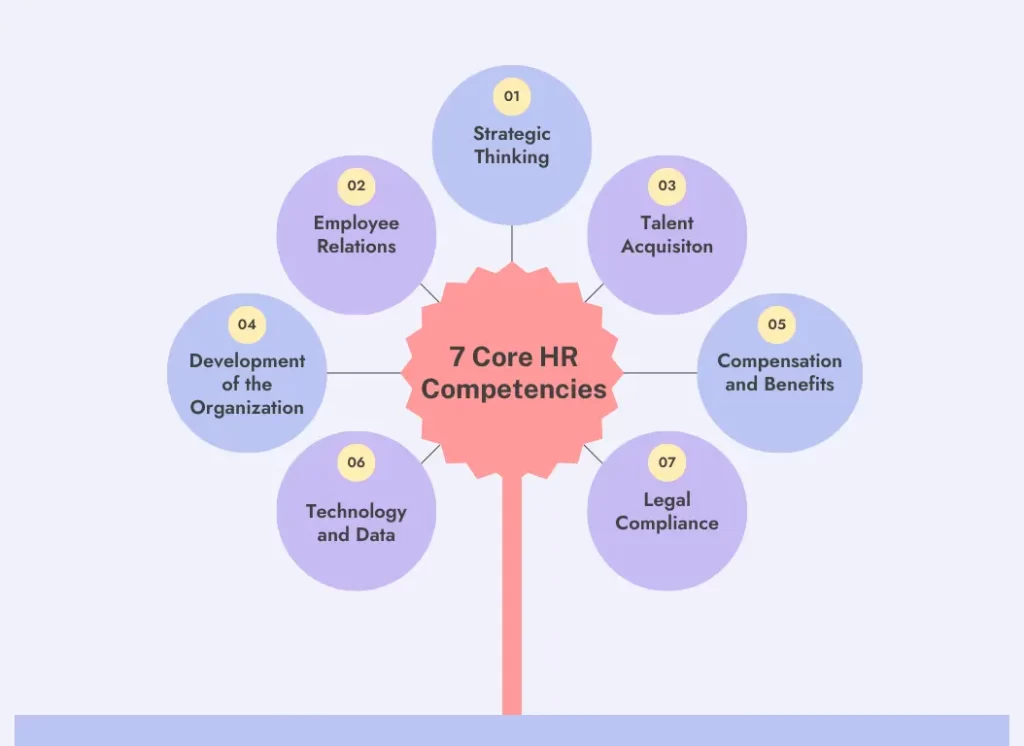
1. Strategic Thinking
Strategic thinking is a must when it comes to HR competencies simply because HR professionals need to have the mindset of planning and organizing for future scenarios all the time. HR professionals require a deeper understanding of organizational goals, current market trends, internal capabilities and a forecast of future workforce needs to ensure long-term organizational success.
With the use of strategic thinking, they proactively develop and take action on initiatives and policies to ensure the physical direction of the organization keeps aligning with long-term goals and objectives. This competency allows for the anticipation and adaptation to changes in the external, helping the repositioning in order to stay competitive.
2. Employee Relations
Employee relations center around building and maintaining positive relations inside an organization. HR professionals need to be proficient in this account as their responsibilities also entail the encouragement of positive employee relations and the resolution of possible concerns or disputes.
HR professionals help foster open communication in organizations and are tasked to actively listen to employee feedback, and implement strategies that will increase employee morale and engagement. It’s the strategic use of employee relations competency that allows HR practitioners to contribute to the retention of employees and the decrease of employee disengagement.
3. Talent Acquisition
Talent acquisition is yet again a key part of HR competencies because, at the nature of HR, there is the need to find and keep top talent. HR professionals need to be skilled in terms of finding the workforce that will help the organization reach its goals as well as create initiatives in order to retain the talent, utilizing tools such as talent mapping in the process.
HR professionals possess the expertise that’s needed to assess candidates, their cultural fit, and potential for growth, ensuring that they in fact align with the objectives of the organization. Additionally, they design programs that focus on talent development and career pathing, and succession planning, thereby creating a culture of continuous learning and development.
4. Organizational Development
This competency is more so about having the ability to assess and address any organizational challenges and opportunities that can improve the effectiveness of the entity as a whole. HR practitioners are skilled in this area because they are the ones who assess the status quo and design the steps ahead if any action needs to be taken.
Talent management competency is also connected to organizational development because by implementing individual development plans and investing in employee growth, organizations can create the type of workforce they require as they grow.
HR is the brains in an organization behind the initiatives for management and cultural transformation, which keeps the organization afloat within constantly changing circumstances in the market. They collaborate with stakeholders to identify the areas for improvement and implement tailored interventions where they see fit. This is a process that requires the foresight and strategic approach that aids organizations keep a dynamic and competitive stance.
5. Compensation and Benefits Management
Compensation and benefits are a critical part of how top talent is retained. Similar to talent management, this HR competency requires HR professionals to understand the needs of their workforce in order to keep them and even more so, attract more talent from the outside.
HR practitioners who are proficient in this area can analyze market trends well, benchmark industry standards, and use that information to ensure that salary initiatives and benefits are competitive enough. Offering rewards and recognition and other non-monetary incentives with a competitive salary, HR professionals are able to contribute to higher levels of employee satisfaction and engagement.
6. Technology and Data Analytics
As with anything else in the modern world, data is a very important part of HR competencies. If HR professionals gather and utilize data well enough, they can make sure that the results are not in vain but instead contribute greatly to organizational success.
Using digital tools to track applicants, and current employee data, sending out employee satisfaction surveys, and designing internal interview questions or recognitions enables HR to collect, analyze, and interpret the data to identify what patterns and opportunities for improvement exist in an organization. Harnessing these types of information makes sure that HR professionals are not only relying on their human skills but are also making data-driven and informed decisions on all accounts, which is why this is one of the core HR competencies.
7. Legal Compliance
Last but not least, regulatory compliance is an HR competency that requires understanding and adherence to applicable laws and related regulations that affect the way HR operates. HR professionals need to be proficient in this area to make sure all processes run according to the law and stay legal, which is integral to the long-term success of any organization.
HR practitioners develop and implement policies and procedures, and related training programs to promote fairness, equity, and diversity that help an organization and its workforce to comply with laws and regulations. By upholding ethical standards in the process, HR practitioners contribute greatly to a positive culture at work and one that encourages integrity and accountability.
8. Performance Management
Performance management is a critical HR competency because it aids create an environment where employees can thrive and contribute to organizational success and the longevity of it. HR professionals who are proficient in performance management design and implement robust systems for setting clear performance expectations, providing ongoing feedback, and evaluating employee performance.
HR practitioners collaborate with managers to develop performance improvement plans and address any issues head-on and effectively. By fostering a culture of continuous improvement and accountability, HR professionals increase employee engagement and productivity, ultimately driving organizational performance.
9. Diversity, Equity, and Inclusion (DEI)
Diversity, equity, and inclusion (DEI) have become essential HR competencies in the modern world. HR professionals proficient in DEI create and implement strategies to foster a workplace culture where every individual feels valued, respected, and included.
They develop policies and initiatives to attract, retain, and promote diverse talent, recognizing that diverse perspectives drive innovation and creativity. HR professionals also advocate for fair and unbiased practices in recruitment, promotion, and compensation, ensuring equal opportunities for all employees within the organization, regardless of their background or identity.
10. Learning and Development
Learning and development is a vital HR competency that is focused on enhancing the skills, knowledge, and capabilities of employees to drive individual and organizational success. HR professionals assess the learning needs of employees across different levels and functions within the organization. They design and implement comprehensive training programs, workshops, and e-learning modules tailored to address skill gaps and support career growth.
Collaborating with subject matter experts and leveraging instructional design principles, HR professionals ensure that learning initiatives are engaging, relevant, and aligned with organizational goals. They utilize various delivery methods, such as classroom training, online learning platforms, and on-the-job experiences, to provide diverse and effective learning opportunities for employees.
HR Competency Framework Example
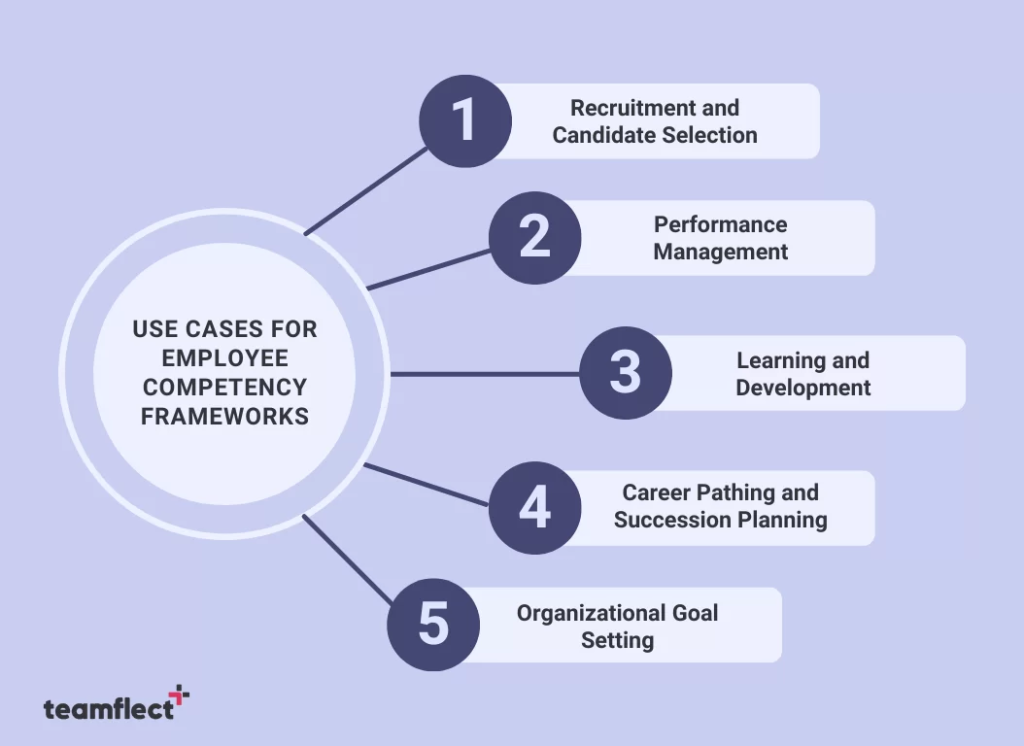
Let’s take a look at an example HR competency framework so that you can have a clearer understanding of how to implement core HR competencies.
Strategic Thinking
- Visionary Leadership: Demonstrates the ability to envision the future direction of HR practices in alignment with organizational goals and industry trends.
- Strategic Planning: Develops and executes HR strategies that drive organizational growth, competitiveness, and sustainability.
- Business Acumen: Understands the broader business context and integrates HR initiatives to support overall business objectives.
- Change Leadership: Leads change initiatives effectively, guiding the organization through transitions and fostering a culture of innovation and adaptability.
Employee Relations
- Conflict Resolution: Effectively manages conflicts and disputes among employees, promoting positive resolution and maintaining harmonious working relationships.
- Communication Skills: Communicates clearly, empathetically, and persuasively with employees at all levels, fostering trust and transparency.
- Employee Engagement: Designs and implements initiatives to enhance employee morale, satisfaction, and commitment to the organization.
- Diversity and Inclusion: Promotes diversity and inclusion within the workplace, valuing and respecting differences to create a culture of belonging and equity.
Talent Acquisition and Management
- Recruitment Strategy: Develops and implements recruitment strategies to attract top talent, utilizing innovative sourcing methods and employer branding techniques.
- Selection and Onboarding: Designs effective selection processes and onboarding programs to ensure a seamless transition for new hires and alignment with organizational culture.
- Performance Management: Establishes performance review competencies that set clear expectations, provide regular feedback, and support employee development goals and growth.
- Succession Planning: Identifies and develops high-potential employees for future leadership roles, ensuring a pipeline of talent to support organizational succession needs.
Organizational Development
- Needs Assessment: Conducts organizational assessments to identify strengths, weaknesses, and opportunities for improvement, informing strategic interventions.
- Change Management: Leads organizational change initiatives, managing resistance, and facilitating smooth transitions to achieve desired outcomes.
- Learning and Development: Designs and delivers training programs that enhance employee skills, knowledge, and competencies to drive individual and organizational performance.
- Culture Transformation: Cultivates a positive organizational culture that values collaboration, innovation, and continuous improvement, aligning with the organization’s values and vision.
Compensation and Benefits Management
- Total Rewards Strategy: Develops and implements comprehensive compensation and benefits programs that attract, motivate, and retain top talent while aligning with budgetary constraints and market trends.
- Pay Equity: Ensures fairness and equity in compensation practices, conducting regular reviews and analyses to identify and address any disparities.
- Benefits Administration: Administers employee benefits programs efficiently and effectively, providing employees with valuable resources to support their well-being and work-life balance.
- Compliance Management: Ensures compliance with legal and regulatory requirements related to compensation and benefits, mitigating risks and avoiding penalties or fines.
HR Technology and Data Analytics
- HR Systems Management: Utilizes HRIS and other technology platforms to streamline HR processes, enhance data accuracy, and improve administrative efficiency.
- Data Analysis: Collects, analyzes, and interprets HR data to identify trends, patterns, and insights that inform decision-making and drive continuous improvement.
- HR Metrics and Reporting: Develops and maintains HR metrics and dashboards to track key performance indicators, monitor progress, and measure the impact of HR initiatives.
- Technology Innovation: Keeps abreast of emerging HR technologies and explores opportunities to leverage new tools and platforms to enhance HR practices and deliver greater value to the organization.
Legal and Regulatory Compliance
- Employment Law Knowledge: Stays informed about relevant employment laws, regulations, and industry standards to ensure HR practices are compliant and up-to-date.
- Policy Development: Develops and maintains HR policies and procedures that reflect legal requirements, organizational values, and best practices, promoting consistency and fairness.
- Ethical Conduct: Upholds ethical standards and integrity in all HR activities, demonstrating honesty, transparency, and accountability in decision-making and interactions.
- Risk Management: Identifies potential legal and compliance risks in HR operations and proactively implements measures to mitigate risks and safeguard the organization’s interests.
Performance Management
- Goal Setting and Alignment: Establishes clear and measurable performance goals that are aligned with organizational objectives, ensuring clarity and direction for employees.
- Feedback and Coaching: Provides timely and constructive feedback to employees, coaching them to improve performance, develop skills, and achieve their full potential.
- Performance Appraisal: Conducts fair and objective performance evaluations, recognizing achievements, identifying areas for improvement, and facilitating meaningful discussions about career development and growth.
- Performance Improvement Plans: Develops and implements performance improvement plans for underperforming employees, providing support and resources to help them succeed while maintaining accountability and performance standards.
Diversity, Equity, and Inclusion (DEI)
- DEI Strategy Development: Designs and implements a comprehensive DEI strategy that fosters a culture of inclusion, belonging, and equity within the organization, aligning with business objectives and industry best practices.
- Training and Awareness: Develops and delivers DEI training programs and initiatives to raise awareness, promote understanding, and cultivate inclusive behaviors among employees and leaders.
- Recruitment and Retention: Implements strategies to attract, hire, and retain diverse talent, ensuring equitable opportunities for advancement and career development across all demographic groups.
- Diversity Metrics and Reporting: Establishes metrics and benchmarks to track progress on DEI initiatives, analyzes data to identify areas for improvement, and reports on outcomes to stakeholders, promoting transparency and accountability.
Learning and Development
- Needs Assessment: Conducts thorough needs assessments to identify skill gaps, training needs, and learning preferences among employees, informing the design and delivery of tailored learning solutions.
- Curriculum Design: Develops and implements learning programs and curricula that address organizational priorities, leverage best practices, and incorporate innovative instructional methods to enhance employee skills and competencies.
- Training Delivery: Facilitates engaging and interactive training sessions, workshops, and seminars, leveraging technology and adult learning principles to maximize learning retention and application.
- Evaluation and Continuous Improvement: Evaluates the effectiveness of learning interventions through feedback mechanisms, assessments, and performance metrics, iteratively refining programs to optimize impact and ROI.
How To Map Out Competencies Organization-wide?
In order to map out all your competencies, you need to utilize technology. But not just any technology. You need a performance management software like Teamflect!
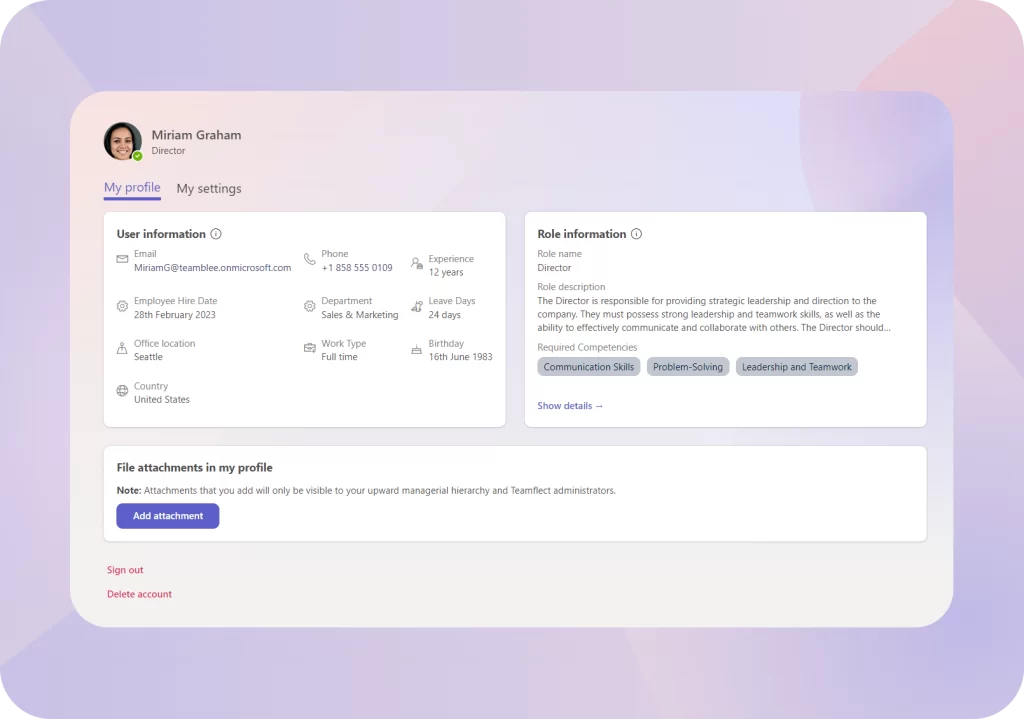
Teamflect is an all-in-one performance management software inside Microsoft Teams that has all the tools you need to effectively run your organization. From surveys to recognitions, meetings to OKRs and tasks, Teamflect has thought of everything for you!
As you make your way through mapping out all the HR competencies and others alike in your organizations, Teamflect will help you create all the necessary information about your employees into the system seamlessly. If you need any help filling out certain parts about your competencies, we’ll have AI and our templates waiting to help!
